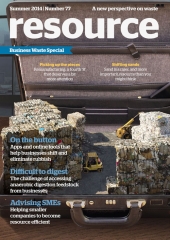The red tape clanger
Most in the waste and resources industry agree that the quality of waste data is ‘rather poor’ (polite version). It’s not clear what the impact of this lamentable state of affairs actually is: Does uncertainty hinder investment? Does the lack of any meaningful tracking of waste mask (and increase) illegal activity in the industry? What costs are incurred elsewhere due to the lack of data? With no time-series data on anything other than council-collected waste, we cannot even understand the effect of policy (not that much is happening in England right now).
Enter, stage left, the Red Tape Challenge, another instance of politicians seeking the thumbs-up from business through promises to roll back bureaucracy. Casting a spotlight on different ‘regulations’, government asked those who cared to comment about the size of the burden they implied. Ministers then had three months to decide which regulations to scrap, ‘with the presumption that all burdensome regulations will go unless the government departments can justify why they are needed’. But, if you decide to scrap regulations only because they are ‘burdensome’, you’ve completely missed the point of why regulations exist.
Some businesses said it was ‘burdensome’ for them to deal with waste transfer notes (WTNs). If you asked any business whether there was any burden in filling out any form, it would be impossible to say ‘no’: paper forms don’t materialise from thin air. Respondents might say: ‘Isn’t it a bit archaic? Why don’t you do this all electronically?’ In response, the Environment Agency could now point them to the edoc option (see p.42). This would, presumably, be an improvement. Indeed, if all those filling out paper WTNs were to use edoc, this could help plug the data gap.
But the Red Tape Challenge is like a cross between Norman Bates and a fired-up bull, seeking to cut through anything burdensome and red, irrespective of the red stuff’s benefits. Defra’s consultation on whether alternatives to WTNs should be accepted sought information regarding: benefits of alternatives (no mention of possible downside); benefits of alternatives not mentioned in the consultation (no mention of possible downside); and estimated cost savings from alternatives.
One might be forgiven for concluding that the decision had already been made.
Notwithstanding the lopsided nature of the questions, respondents gave a less-than-ringing endorsement for change. The majority said that they couldn’t make any meaningful estimate of potential savings from using alternatives to WTNs, and several indicated costs might increase. Only one respondent indicated savings, suggested at £1,380 (more than half of which was postage costs that would disappear under edoc).
The consultation lasted six weeks, straddling Christmas (a uniquely ‘Red Tape Challenge’ approach to consultation – ‘launch it when it’s least likely to burden businesses’). Respondents included a massive 13 businesses, with only four favouring alternative documentation; six were against and three had no strong opinion. Those in favour all agreed the greatest benefit would be the reduction in paperwork (which, again, would be eliminated by edoc).
 This article was taken from Issue 77
This article was taken from Issue 77Notwithstanding the above, Defra commented: ‘Given the strong government commitment in response to the Red Tape Challenge to provide for alternatives to WTNs and the support of businesses including key stakeholders such as the Federation of Small Businesses and the National Farmers Union, Defra and Welsh Government intend to proceed with the proposed amendments to… allow alternative documentation to be used to record the written description of waste.’
The point of going through a consultation seems to have been lost. The Federation of Small Businesses and the National Farmers Union may represent a range of businesses, but 15 trade bodies responded, with six in favour of alternatives, and eight against.
Whilst this was going on, the industry was praising the introduction of edoc, with many suggesting its use should be mandatory to ensure the UK has a system to improve capture of waste data. Whatever its possible merits in creating savings (only on paper?) in administrative burden, the downside of allowing alternative reporting systems is that it pushes back the day when we have a sensible system of data capture.
Ideology is rarely a sound basis for decent policymaking, and, frankly, if ideology is going to be the sole determinant of policy, then consultation becomes the purest form of administrative burden. 






